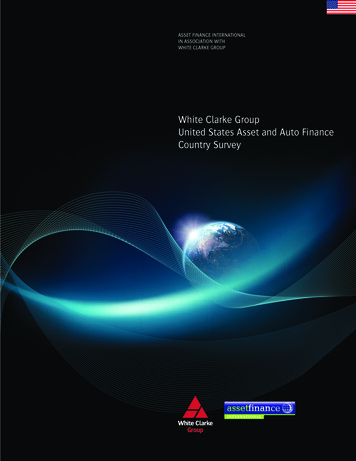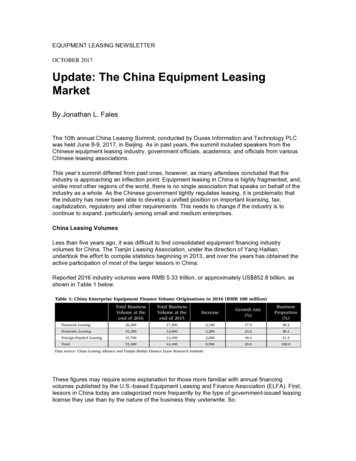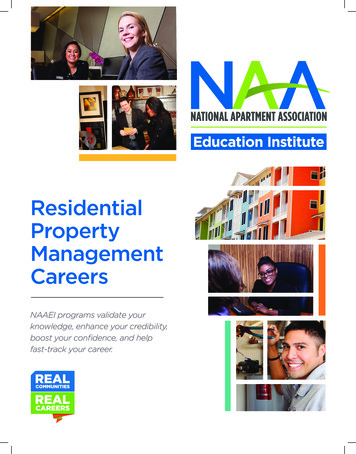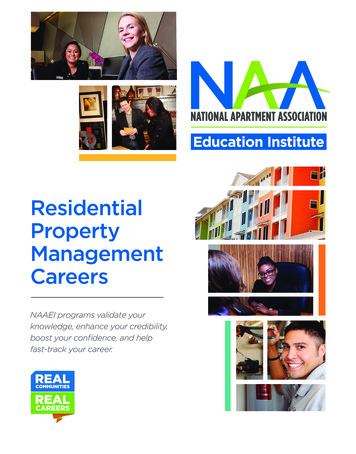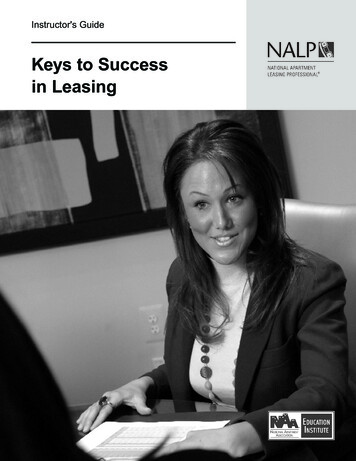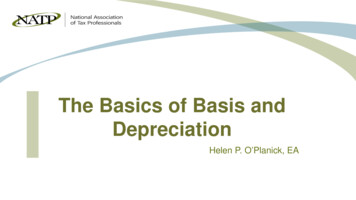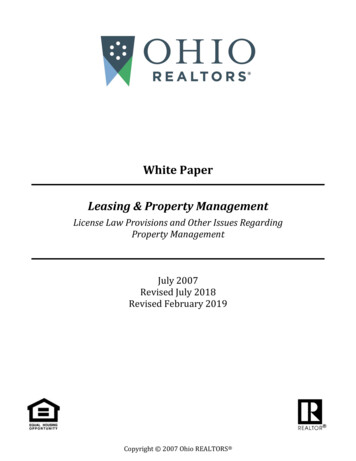
Transcription
White PaperLeasing & Property ManagementLicense Law Provisions and Other Issues RegardingProperty ManagementJuly 2007Revised July 2018Revised February 2019Copyright 2007 Ohio REALTORS
IntroductionWhether it's a desire to avoid the volatility of the stock market or to the proliferation of the "getrich quick" in real estate books, more and more people are investing in real estate. Often theseinvestors find out that managing property is not as easy as they thought and are required to bringin professionals to manage and lease their property. The company they hire must have a realestate broker's license as the management of commercial or residential property is an activity thatrequires a real estate license. In this White Paper, the license law provisions regarding propertymanagement will be addressed.License Law Requirements For Property ManagementOhio Revised Code Section 4735.01(A) provides a list of activities that if performed for another fora fee requires a real estate license. This list includes anyone who "operates, manages, or rents, oroffers or attempts to operate, manage, or rent other than as a custodian, caretaker, or janitor, anybuilding or portions of buildings to the public as tenants." Also included on the list of activitiesthat require a license are any attempts to lease property, any acts directed at procuring tenants fora property, the negotiation of leases, or advertising or holding oneself out as in the business ofleasing property. Under Ohio law, performing any of these acts without a license constitutes afirst-degree misdemeanor and subjects the offender to a civil penalty of up to one thousanddollars per violation. Each day a violation occurs or continues is a separate violation.Because Ohio law requires a real estate license to engage in property management activities, italso requires that the property management services be conducted through the real estatebrokerage. A real estate salesperson cannot manage property in his own name or in the name of aseparate management company that he has formed. When a salesperson is performing acts thatrequire a license (i.e. property management services), these acts must be performed in the nameof the brokerage with whom he is affiliated. A real estate broker may also not manage property ina name other than the name that appears on the brokerage license. Nor can a broker form aseparate unlicensed company for management services. Instead, the property managementagreement and all property management services must be performed in the name of the realestate brokerage.Since April 6, 2017, when HB 532 was enacted, the license law has permitted a brokerage to havemore than one trade name (dba). This gives a brokerage the option to provide propertymanagement services under a separate dba. The dba must be approved by the Superintendent ofthe Division of Real Estate and Professional Licensing as well as registered with the Secretary ofState. To obtain approval by the Superintendent, there must be commonality between thebrokerage trade names. As with any brokerage name approval, a trade name cannot be the sameas, or must be clearly distinguishable from, the name of any existing brokerage and cannot bemisleading to the public. A brokerage is limited to five dbas and must have a separate trustaccount for each dba. Any approved dba will be identified on the brokerage license.HB 532 also permitted a principal broker to be the principal broker for more than one brokerage.This allows a principal broker to establish a separate brokerage to provide property managementservices. In order for a principal broker to be the principal broker for another brokerage, theprincipal broker must be an officer or shareholder if the brokerage is a corporation, a member ifWhite Paper – Leasing & Property Management1
the brokerage is an LLC, or a general partner if the brokerage is a partnership. As with additionaldbas, there must be commonality between the brokerage names, the name cannot be misleadingto the public and must be clearly distinguishable from the name of any existing brokerage.As property management is an activity that requires a real estate license all services must beperformed in the brokerage name and in compliance with the requirements of Ohio license law,Chapter 4735 of the Ohio Revised Code. The provisions in Chapter 4735 with regard to propertymanagement services are discussed below.Property Management Account(s)A property manager generally collects rents, security deposits and possibly advances from theowner to cover the property expenses. Ohio license law includes requirements for the handling ofthese funds. All brokerages engaging in property management must have a separate propertymanagement trust account or an account in the property owner's name on which the brokeragehas signatory authority.Ohio Administrative Code Section 1301:5-5-11 requires that the property management trustaccount be a separate trust account in the brokerage's name and must be designated as thebrokerage "property management trust account." The account must be at an Ohio depository andthe name, account number, and location of the depository must be provided to the Ohio Division ofReal Estate and Professional Licensing. Security deposits, rents and money received from theowner or on the owner's behalf for payment of expenses related to the management of theproperty must be deposited in this account. The brokerage can maintain one propertymanagement trust account for all owners they manage for or may have several propertymanagement trust accounts (i.e. one for each owner whose property it manages).A broker may maintain the broker's own funds in the trust account only when they are clearlyidentified as the broker's funds and only for the following reasons:1. If the depository in which the account is maintained requires that a minimum balance bemaintained in order to keep the account open, the broker may maintain that amount inthe account and designate the amount as the broker's funds.2. If the depository in which the account is maintained requires a service charge be paid forthe account, the broker may maintain a reasonable amount to cover the service chargeand designate the amount as the broker's funds.Unlike the trust account a broker must maintain for earnest money deposits, a propertymanagement trust account may, but is not required to earn interest. Unless the owner(s) andbroker agree otherwise, any interest earned must be payable on a pro rata basis to the owner(s) ofthe property on whose behalf monies are deposited in the property management trust account.The interest shall be paid or credited on a regular basis but in no event less than quarterly.However, the property owner(s) and broker can agree that the interest due the owner(s) can bepaid in a manner other than specified above and to party(ies) other than the property owner(s).Any such agreement must be in writing and signed by the owner(s) and the broker.White Paper – Leasing & Property Management2
In the course of managing property a property manager will usually make expenditures on theowner's behalf. This may include paying maintenance and repair bills, utility bills, mortgagepayments and property taxes. If the brokerage property management trust account contains fundsfor more than one owner, a property manager must make sure that each owner has enough fundsin the trust account to cover that owner's expenses. One owner's funds cannot be used to payanother owner's expenses. Therefore, before disbursing any funds to pay an owner's expenses theaccount balance for that owner must be sufficient to cover the disbursal.The other option to maintaining an owner's funds in the brokerage property management trustaccount is to establish a property management account in the owner's name on which the brokerhas signatory authority. The requirements for this account are provided in Ohio AdministrativeCode Section 1301:5-5-23. The broker is required to have a written agreement with the ownergiving the broker signatory authority to make withdrawals from the owner's propertymanagement account. This can be provided in the brokerage's property management agreementwith that owner. The agreement must specify the purposes for which the brokerage may makewithdrawals from the owner's account and any dollar limits that exist on the amounts thebrokerage may withdraw. Any modifications to these terms must be agreed to in writing.Ohio license law has very specific record keeping requirements for a brokerage regarding depositsand disbursements from a property management account. License law requires a separate ledgerfor each owner of property managed by the brokerage. Each ledger sheet must identify thefollowing information: Name and/or address of the property; Parties to the transaction; Amount, date, and purpose of deposit(s); Method of receipt including: Cash and associated receipt number; Negotiable instrument number; Money order number; Electronic funds transfer number; Funds transfer number; Automated Clearing House (ACH) number; Credit or debit card transaction number; Party from whom deposits are received; Party to whom disbursements are made; Method of disbursement including: Cash and associated receipt number; Negotiable instrument number; Money order number; Electronic funds transfer number; Funds transfer number; Automated Clearing House (ACH) number; Credit or debit card transaction number; Amount of disbursement, party, and if applicable,account to whom funds are disbursedand purpose of disbursement; Running balance of funds on deposit for the particular owner of property; Amount of interest earned on behalf of the owner(s) of the property(ies), if any.White Paper – Leasing & Property Management3
Ohio license law requires all brokerages that engage in property management activities to providean accounting to each owner of managed property on at least a quarterly basis. The purpose ofthis requirement is to assure that owners are regularly updated on the funds the brokeragereceives and disburses on their behalf.Principal brokers of brokerages that engage in property management activities should makecertain they understand the property management account requirements and that they fullycomply with these regulations. Property management account violations are one of the mostcommon license law violations by property managers.Security DepositsSecurity deposits are routinely collected when leasing property to secure performance by thetenant of his obligation under the lease. Ohio Administrative Code Section 1301:5-5-11(D)provides that security deposits received by the brokerage must be deposited and maintained inthe property management trust account unless the lease and property management agreementprovide otherwise. A brokerage may have a separate property trust account just for tenantsecurity deposits. Security deposits which are maintained in the property management trustaccount must be clearly identified and credited to the tenant.If the owner does not want tenant security deposits to be deposited and/or maintained in theproperty management trust account, the property management agreement and lease must providehow security deposits will be handled. For example, the lease and property managementagreement could provide that tenant security deposits will be paid directly to the owner. If theowner would like the security deposits to be deposited in the brokerage property managementtrust account but not maintained there (i.e. used to pay expenses of the property) the propertymanagement agreement and lease must provide for this.Requirements of a Property Management AgreementOhio Revised Code Section 4735.55 provides that all written agency agreements contain certainrequirements. An agency agreement is defined as "a contract between a licensee and a client inwhich the client promises to pay the broker a valuable consideration, or agrees that the licenseemay receive a valuable consideration from another, for performing an act that requires a realestate license under this chapter." A property management agreement would fall within thedefinition of an agency agreement and therefore must contain the following requirements:1. A definite expiration date.2. If the property management agreement is for managing residential property, therequired fair housing language and logo. The required fair housing language and logo areattached hereto as Exhibit A.3. A place for the licensee and the owner to sign and date the agreement.4. The licensee must provide a copy of the signed agreement to the owner.White Paper – Leasing & Property Management4
Consumer Guide to Agency RelationshipsOhio Revised Code Section 4735.56 requires brokerages to develop their own policy on agency.This policy must be titled "Consumer Guide to Agency Relationships."The Consumer Guide to Agency Relationships is required in the following transactions:1. The sale or lease of vacant land;2. The sale of a parcel of real estate containing one to four residential units;3. A residential lease where the term of the lease is more than 18 months.A brokerage providing property management services would only be required to use theConsumer Guide if the services he is hired to perform includes the rental of a residential propertywhere the lease could be for a term of more than 18 months. In this case, the Consumer Guide isrequired to be provided to the owner before the property is shown or marketed. Therefore, at thetime the property management agreement is entered into.The owner must sign acknowledging receipt of the brokerage's Consumer Guide. Thisacknowledgement can either be on the Consumer Guide itself or on a separate document.However, language acknowledging receipt of the Consumer Guide cannot be included in theproperty management agreement as the receipt language may not be included in any otheragreement to which the owner is a party.The only time the Consumer Guide would be required to be provided to a potential tenant is if thetenant is looking for residential property and the lease could be over 18 months.If the rental property is residential and the lease could be over 18 months, a licensee is required toprovide the potential tenant with the Consumer Guide to Agency Relationships before the earliestof the following events: Pre-qualifying the tenant; Requesting specific financial information; Showing property (other than at an open house); Discussing the making of an offer to lease; or Preparing an offer to leaseWhichever of the above events occurs first will trigger a licensee's obligation to provide theConsumer Guide to a potential tenant. When a transaction requires use of the brokerage'sConsumer Guide with a tenant, the tenant must sign the Consumer Guide or a separate documentacknowledging receipt of the brokerage's Consumer Guide. Language acknowledging receipt of theConsumer Guide cannot be included in the lease as the receipt language may not be included inany other agreement to which the tenant is a party.The Consumer Guide is not required for residential leases 18 months or less or commercial,industrial, or retail leases of any duration.White Paper – Leasing & Property Management5
Agency Disclosure StatementThe Agency Disclosure Statement is a state form which was developed to disclose to buyers,sellers, landlords and tenants who the licensee(s) represent in the real estate transaction. Therequirements for use of the Agency Disclosure Statement are provided in Ohio Revised CodeSection 4735.58. As with the Consumer Guide to Agency Relationships, a licensee is not requiredto use the Agency Disclosure Statement for residential leases of 18 months or less. However, theAgency Disclosure Statement is required for commercial, industrial or retail leases of any durationand all residential leases over 18 months. On those leases, licensees working directly with atenant, whether as a tenant's agent or the landlord's agent, must provide the tenant with theAgency Disclosure Statement no later than the time the tenant is ready to make an offer to leasethe property. After completing the appropriate sections of the form, the licensee is required to askthe tenant to sign the form. Once the form is signed the licensee can begin discussions with thetenant regarding his offer to lease the property. The tenant signed Agency Disclosure Statementmust be given to the landlord prior to him being presented with the tenant's offer to lease. Thelandlord should also be asked to sign the form.Maintaining Property Management RecordsBrokers engaging in property management deal with an array of paperwork. These documents caninclude the property management agreements with owners, Consumer Guide to AgencyRelationships, tenant leases, Agency Disclosure Statements, work orders, security depositdisbursements, invoices for work done on the property and receipts for bills paid, propertymanagement trust account records, to name just a few.Ohio Revised Code Section 4735.18(A)(24) requires brokers to keep complete and accuraterecords of all transactions for a period of three years. Therefore, brokers engaged in propertymanagement must keep all documents relative to the management of property for three years.Residential Rental Property – Licensure ExemptionA common question of brokers engaged in property management is what duties their unlicensedstaff can perform. For example: Can an unlicensed employee show an apartment? Can thereceptionist collect rent checks or provide information over the phone regarding rentalproperties? Ohio licensure law contains a rule which answers these questions for residentialproperty management.Ohio Administrative Code Section 1301:5-5-07 provides a list of activities that an unlicensedperson can and cannot perform with regard to residential property management. This rule createsan exemption from the licensure requirement for certain activities performed by people workingin residential property management. The licensure exemption does not apply to commercial,industrial or retail property management or in real estate sales of any type. The rule also providesthat the exemption only applies to individuals working under the supervision of a principal brokeror management level licensee and whose compensation for service is primarily on a salaried orhourly basis.White Paper – Leasing & Property Management6
The duties an unlicensed employee can perform when working with residential rental propertyare the following: maintenance clerical or administrative support collector accept rents and/or security deposits which are made payable to the owner orreal estate brokerage exhibit or show residential rental units to prospective tenants furnish published information regarding the property supply applications and leases receive applications and leases for submission to the owner or broker for approvalThe rule also provides that an unlicensed employee may not perform the following duties: negotiate contracts or leases deviatefrom the rental price and/or other terms and conditions previously established bythe owner or principal broker or management level licensee when providing information toprospective tenants approve rental applications or leases settle or arrange the terms and conditions of a lease on behalf of the owner or brokerage offer inducements to prospective tenants unless they are previously advertised or arrangedwith the owner or principal broker interpret or provide their opinion concerning the terms or conditions of a lease indicate to the public that he is in a position of authority which has the ultimate managerialresponsibility of the rental propertyThis rule clarifies what duties unlicensed employees of the brokerage can perform with regard toresidential rental properties. Clearly unlicensed employees can provide information toprospective tenants, show units and supply and accept tenant applications and leases. However,unlicensed employees are not the decision makers. They cannot set the terms of a lease ormanagement agreement or sign a lease or property management agreement on behalf of thebrokerage. These are activities that require a license.Principal brokers of brokerages that engage in property management must understand whatactivities their unlicensed employees can perform. Principal brokers must be able to provide clearguidance to their employees regarding the duties they are permitted to perform under Ohio law. Itis the principal broker's responsibility to make sure that their employees do not cross over thisline and perform activities limited to only licensed agents.Advertising RequirementsOhio license law contains several advertising requirements which apply to brokerages, includingthose engaged in property management and leasing. Advertising is defined in Ohio AdministrativeCode Section 1301:5-1-02. Advertising includes any means by which a licensee makes known tothe general public properties for sale or lease or any services for which a real estate license isrequired. The method used to convey the advertising may include newspapers, magazines, radio,White Paper – Leasing & Property Management7
television, signs, internet websites, unsolicited mail, voicemail, e-mail, facsimile transmissions,social networking sites, blogs, business cards or a property listing database service. Advertisingdoes not include forms of private communication between a licensee and a client, customer orprospective client provided such communications are initiated at the request of the client,customer or prospective client.Any promotional materials that go out to the general public regarding the brokerage or a propertyis considered advertising. The promotion may be distributed by print, radio or display and mayinclude business cards, stationary, yard and office signs, personal brochures, newsletters,calendars and fliers.All advertising must include the brokerage name and indicate that it is a licensed broker. Thebrokerage name in the ad must be the same as it appears on the brokerage license unless one ofthe following exceptions apply: Ifthe brokerage has been granted approval to use a "dba", then a trade name as it appearson the license is the name that must appear in all ads. If a brokerage has more than oneapproved trade name, at least one of the approved trade names must be included in theadvertising. Words or abbreviations included in the licensed name that indicate the legal frameworkunder which the licensee conducts business, such as "Inc." or "Co.", are not required toappear in the ads. The words "Realty" or "Real Estate" or the authorized use of a franchise name or insigniaindicating membership in a real estate organization (i.e. "Realtor" or "R") may be includedeven though not part of the brokerage's licensed name.Any licensee's name appearing in an advertisement must consist of his name as it appears on hislicense with one exception. A licensee may advertise in a first name other than the name on thelicense or advertise with the licensee’s maiden name provided that the preferred first name or themaiden name is not misleading and is registered with the Ohio Division or Real Estate andProfessional Licensing. The preferred name or maiden name must be registered with the Divisionprior to use by the licensee.Ohio Revised Code Section 4735.16(B)(3) requires that the brokerage name be displayed in equalprominence with the salesperson's name. Therefore, the name of the salesperson cannot bedisplayed more prominently than the brokerage name. In determining prominence, the type size,color and style will be considered as well as location of the names on the advertising piece.Ohio Administrated Code Section 1301:5-1-02(B) provides the only exception to the requirementthat the brokerage name be displayed at least in equal prominence with the salesperson’s name.The equal prominence requirement does not apply if the advertising, including any website, is notwithin the ownership or direct control of the licensee or his brokerage and the terms of use or theformat of a website or other advertising medium does not allow the licensee to control the sizeand prominence of the brokerage and salesperson’s names.Ohio Revised Code Section 4735.18(A)(21) provides that a licensee can be disciplined by the OhioReal Estate Commission if the licensee publishes advertising which is misleading or inaccurate orWhite Paper – Leasing & Property Management8
in any way misrepresents any properties, terms, policies, or services of the business conducted bythe brokerage. To warrant disciplinary action, it is not necessary to find that the inaccurateinformation was included intentionally or even knowingly. It need only be shown that theadvertising was incorrect or misleading. Therefore, all ads should be reviewed for errors ortypographical mistakes.Ohio Administrative Code Section 1301:5-1-02 provides additional requirements specific tointernet advertising. With the exceptions noted below, all internet advertising must disclose thebrokerage name on every viewable page of the website. A web page is defined as one that may ormay not scroll beyond the borders of the screen.The two exceptions to the requirement that the brokerage name be included on every page is asfollows:1. When advertising in electronic messages of limited characters, a licensee must providea direct link to a display that includes the brokerage name.2. When advertising on a website not owned or controlled by the licensee or his brokerageand the website’s terms of use limit the licensee’s ability to include the brokerage name,the licensee must provide a direct link to a display that includes the brokerage name.Information on a website maintained by a licensee which becomes outdated or expired, must beupdated within fourteen days of the information becoming outdated or expired. Each websitemaintained by a licensee must disclose the date upon which the information contained on the sitewas most recently updated. If a licensee's website is maintained on the licensee's behalf by a thirdparty, the licensee must provide to the third party written notice of any updates to outdated orexpired information so that the site can be updated in a timely manner. A licensee who providessuch timely notice will not be in violation of the license law if the third party fails to make thechange as notified.The license law internet advertising requirements only apply to websites within the licensee'sownership or control. A licensee is not responsible for the accuracy of information taken from hiswebsite or advertising and placed on a website or in advertising not within the licensee'sownership or control.Ohio Administrative Code Section 1301:5-1-02 also addresses a licensee advertising anotherbrokerage’s listing. This section provides that a licensee must first obtain written consent toadvertise the property and must include in the advertisement the name of the listing brokerage inthe same or larger size type as used to describe the property.Real estate licensees who own rental properties are often uncertain how to advertise their ownproperty for lease. A licensee advertising to lease real estate that he owns must be identified insuch ads by his name and indicate that the property is agent owned. The name of the brokeragewith whom the licensee is affiliated would only be required to appear in the ads if the property islisted with the brokerage. Ohio license law does not require licensees to list their property for saleor lease with the brokerage with whom they are licensed. They can sell or lease their ownproperty on their own as any other owner of real estate can do. However, handling a licensee'sown property through the brokerage may be a condition of affiliation with that brokerage.White Paper – Leasing & Property Management9
Division Compliance AuditsBrokers engaged in property management are subject to compliance audits by the Division of RealEstate and Professional Licensing as any other licensed brokerage. The purpose of a complianceaudit is to provide education and awareness of real estate law and to ensure compliance with alllicense law requirements.The compliance audit entails a thorough review of the brokerage documents. Some of theinformation investigators review during an audit includes the following: RealEstate Licenses: The brokerage license must be prominently displayed in the mainoffice and any affiliated salespersons' licenses must be available for inspection. Advertising: Examples of brokerage advertising, which may include office and yard signs,newspaper and magazine ads, fliers, newsletters, business cards, stationery and envelopes. Brokerage Contract and Required Forms: This may include the Property ManagementAgreement, Tenant Leases, Consumer Guide to Agency Relationships, Agency DisclosureStatement and the Brokerage Company Policy as required by Ohio Revised Code Section4735.54. Fair Housing Sign/Pamphlet: In each brokerage office a fair housing sign must be displayedin the same area as the brokerage license is displayed. Pamphlets with the same fairhousing information must be available to the public. The fair housing sign and pamphletare attached as Exhibit B and Exhibit C. Transaction Files: Random checks may be conducted of property management and leasingfiles. Property Management Account(s): The investigator will review the most recent bankstatement(s), and the statement(s) and account balances must reconcile.If the investigator determines that the brokerage is not in full compliance with the license lawrequirements, the principal broker will be notified of any deficiencies and asked to correct thoseissues. The principal broker should promptly rectify any non-compliance issues as the Divisionrequests.Licensure Exemption – Regular Employee of OwnerA real estate broker's license is required to manage property owned by another, for a fee or othervaluable consideration. However, Ohio Rev
estate broker's license as the management of commercial or residential property is an activity that requires a real estate license. In this White Paper, the license law provisions regarding property . property management trust account, the property management agreement and lease must provide how security deposits will be handled. For example .


